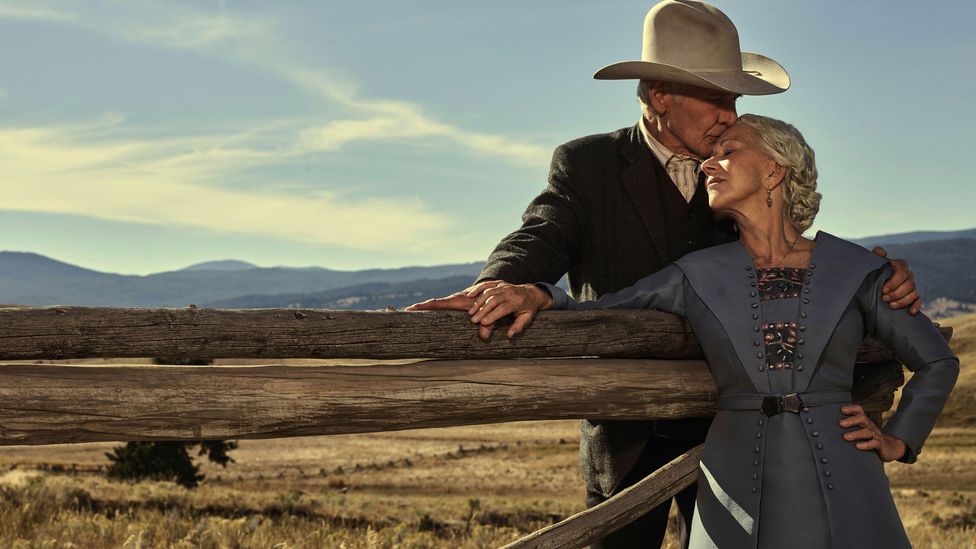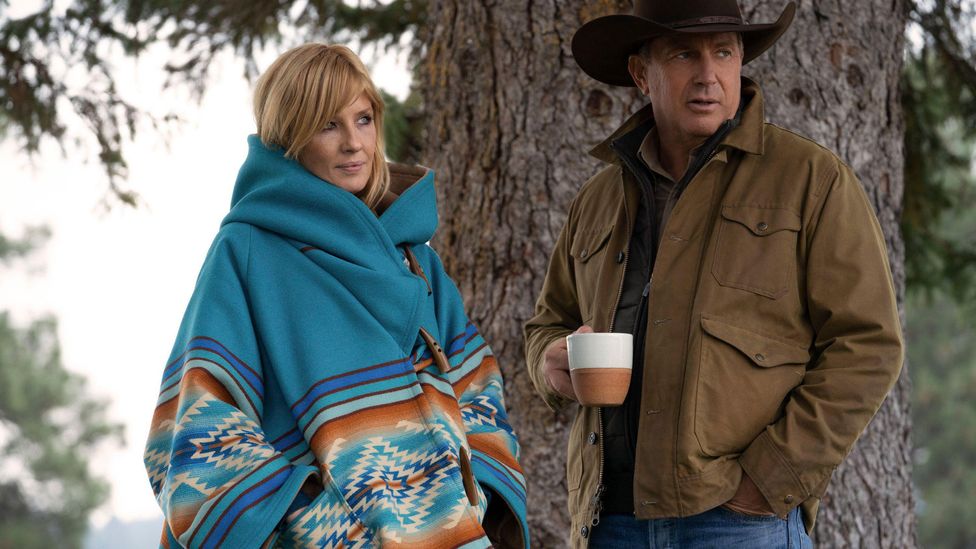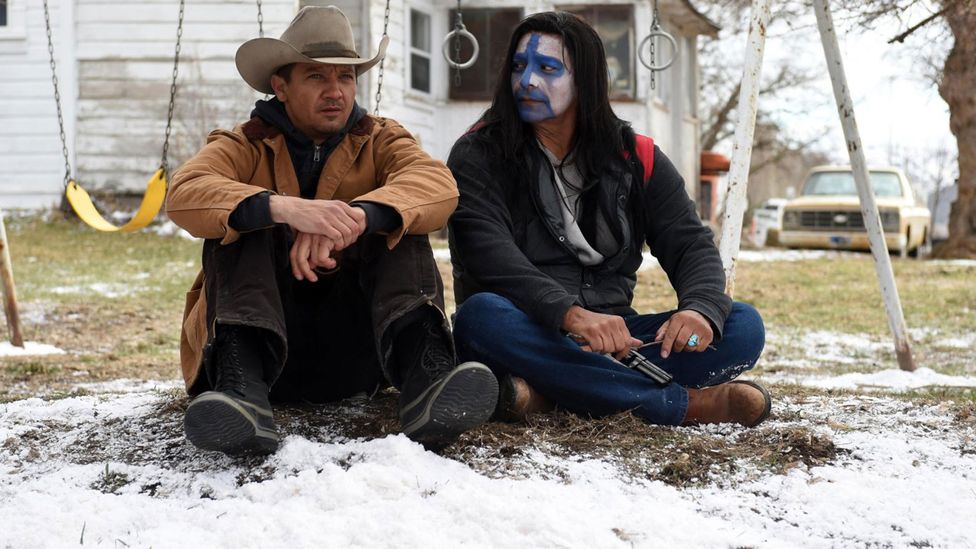The violent TV universe gripping the US

The first scene of 1923 reminds us exactly who the Duttons are. Taylor Sheridan’s latest prequel to his hit Paramount series Yellowstone, about a family that owns a monstrously big ranch in Montana, takes us back to the great-great-great aunt and uncle of Yellowstone’s hero, John Dutton III (Kevin Costner). A bloodied Helen Mirren – as that era’s matriarch, Cora – chases a man through the woods with a rifle and shoots him dead. Then and now, the Duttons are the killingest family this side of The Sopranos.
More like this:
– 10 TV shows to watch this December
– The 21 best TV shows of 2022
– How a metal-detecting show went global
In another ideal bit of casting, Harrison Ford plays Cora’s husband, Jacob, a no-nonsense rancher who also offers a key to the family’s ethos. When a small ranch owner challenges him about having too much land and power, Jacob says in a voice of steel, “I have what my family fought for”, a line that could have come straight out of his 2022 descendant’s mouth. It’s the Duttons v the world, as they fight to hold onto their ranch at all costs, bribing and murdering along the way.

In 1923, Harrison Ford and Helen Mirren play another generation of the Montana-based Dutton family, first established in Yellowstone (Credit: Paramount+/Alamy)
1923, which premiered on Sunday in the US, is the latest addition to a television empire so enormous it has a name, the Taylor Sheridan universe – or more simply, the “Taylorverse”. Once a struggling actor, Sheridan turned to writing films with acclaimed screenplays that merged action and complex characters in Sicario (2015) and Hell or High Water (2016), and later wrote and directed Wind River (2017). But the old-fashioned Yellowstone, which he co-created, was a popular success that changed everything for him. Sheridan has since created 1923 and an earlier Dutton origin series, 1883, as part of a reported $200 million contract with Paramount for multiple shows. They include the current Tulsa King, with Sylvester Stallone, and The Mayor of Kingstown with Jeremy Renner, and two upcoming series, the contemporary Yellowstone spinoff 6666 and the CIA drama Lioness with Zoe Saldana.
What are the Taylorverse’s politics?
The three Dutton family series are a phenomenon partly because of their singular, retro vision. Sheridan’s shows embrace the heroic myth of the Old West and of American individualism, reinventing it for today’s increasingly divided country. It is a paradoxical vision. The shows have always acknowledged that white settlers usurped the land, tragically robbing and mistreating the Native Americans. At the same time, the series’ message seems to be: Hey, the Duttons own it now, and they’re in no hurry to give it back. The Dutton heroes speak most directly to those conservatives who want to return to a glorified past, when patriarchs ruled and the government left them to their own devices. But the shows are elusive enough culturally, and entertaining enough as drama, to reach liberal viewers, too.
Sheridan has said that his series are not, as they are often called, Republican “red-state shows” – yet while they do avoid overt political statements, his claim is disingenuous. With Yellowstone’s emphatic idea that the country was better in the past, its politics quickly became a flashpoint, a central part of the cultural conversation about the show. John Dutton is constantly battling the Native Americans and big corporations that want to take over his ranch. He rails against the government, city dwellers and environmentalists. In the current season, the show’s fifth, he has become Montana’s governor, running on the promise, “I am the opposite of progress. I am the wall it bashes against”. Governor Dutton’s political party is never acknowledged one way or another, but if that message isn’t conservative (with a small c), nothing is. As the sociologist and cultural critic Tressie McMillan Cottom said in a discussion with Vulture about the show, “Yellowstone is a powerful cultural object in large part because it does not feel like a political object to millions of people”. And just last week, The New York Times bluntly called the show “a mirror for American politics”. The article that followed was a focus group with what the paper calls “superfans” from across the political spectrum about the show’s appeal. The feature itself is an indication of how central Yellowstone has become culturally, even though the results are disappointing, with bland answers that praise the series for “authenticity” and for the Dutton family’s tight bond.
The trajectory of Yellowstone’s cultural traction is easier to chart. The show premiered in 2018, and was popular almost exclusively in the heartland, but by 2021 it was US television’s highest-rated drama overall.
In the last year alone it has gone from what Vanity Fair called “The Most-Watched Show Everyone Isn’t Talking About”, to generating a flutter of articles wondering why it didn’t get Emmy nominations. That question shouldn’t be a mystery. The show is conventional and sometimes not very good, its dialogue on-the-nose and ridiculous. When John Dutton’s daughter, Beth (Kelly Reilly), warns a business competitor: “You are the trailer park, I am the tornado”, the line does not land as ironic or campy. But the series continues to expand its reach. According to The Wall Street Journal, by season four, 28% of viewers were in small towns and 28% in major cities, where it barely registered at first.

Yellowstone has proved a potent force with its mix of Western elements, melodrama and contemporary political currents (Credit: Paramount/Alamy)
Part of the secret of the Sheridan universe’s success is that the natural landscape is vast and pretty, and the family’s loyalties, betrayals and infighting can be absorbing even when the plot turns are ludicrous. In 1883, the Duttons headed West and Jacob’s brother, James, created the Yellowstone ranch on the site where his daughter, Elsa, was buried. In over-the-top Western fashion, she staggered around with a poisoned arrow through her abdomen and even rode a horse before the arrow killed her. Elsa’s excruciatingly overwritten narration ran through the series: “The river doesn’t care if you can swim. The snake doesn’t care if you love your children.” Unfortunately, her voiceover turns up again in 1923, but at least she offers useful information, telling us that Jacob and Cora arrived in 1894 and raised James’ two orphaned sons. And she follows Cora’s lethal first scene with a voiceover that goes to the heart of the Sheridan world. “Violence has always haunted this family,” she says. “We hunt it down, we seek it.”
A promising new entry
So far, it is great fun to watch Ford and Mirren gamely roaming around the Old West. Mirren, with the accent of an Irish immigrant, totes a rifle and drives a buggy. Ford wears a Stetson, rides his horse into town amid cars on the dusty street, and figures out how to survive a drought. Paramount+ released only a single episode for review (that premiere drew a large audience of 7.4 million viewers), so there’s no way to know how well the series will hold up or how political it might become, but it is obvious that Jacob and Cara will face interlopers and changing times.
More tellingly, the new series expands the scope of the Dutton story, positioning them in the context of US history itself. Jacob and Cora’s great-nephew, Spencer (Brandon Sklenar), is now a big game hunter in Nairobi, having nightmares about his experience fighting in World War One. A subplot shows Native American girls at a boarding school where they are forced to abandon their own language, and where an abusive nun (Jennifer Ehle) raps their hands with a stick, and a priest (Sebastian Roche) beats both the nun and a student.
Sheridan’s attention to the injustices Native Americans have suffered is an important strand running through his career. Wind River is a taut, first-rate drama about an investigation into the suspicious death of an Indigenous woman. And in Yellowstone, Thomas Rainwater (Gil Birmingham), the Chairman of the Confederated Tribes of Broken Rock, is a mostly sympathetic character who wants the Duttons’ land back for his people and says he will use the white man’s conniving business tactics to get it. That one thread tilts the Sheridan universe a bit so that it can’t be seen as purely conservative.
Hitting all the notes of a Sheridan Western, 1923 also includes a cattle drive. If you’re not a fan of long scenes of cattle or sheep moving across the screen, the fast-forward button is your friend. And Cora explains to her other nephew’s fiancee that the Dutton men will always put the ranch before women; just get used to it.
Yellowstone set that pattern, mixing the Western with melodrama and political undercurrents. In the current season John’s son Jamie (Wes Bentley) is now Montana’s attorney general, plotting against the family. Kayce (Luke Grimes), his youngest son, is married to a Native American woman, Monica (Kelsey Asbille), and they seem to flit between Yellowstone and the reservation from one season to the next. Beth, once a corporate shark, is back at the ranch, smoking and drinking constantly, bent on helping her father and on destroying Jamie. At times Yellowstone resembles Bonanza if one of the sons on that classic Western had been a vindictive, out-of-control, Daddy’s Girl.

Sheridan’s 2017 film Wind River showed his interest in exploring the injustices suffered by Native Americans that has carried into his TV work (Credit: Paramount+)
But violence and scorn for the government and the law are the traits that best define the Duttons and the culture of the Sheridan universe, as if even the 2022 descendants still lived in the Old West. The family has a taste for vigilantism, a tactic the shows don’t always condone but never actually condemn. In previous seasons, Jamie has killed a snoopy reporter and his own biological father. Kayce has killed his wife’s brother in a range battle over cattle, and murdered a sexual predator because he deserved it. John ordered the deaths of two men who had kidnapped his grandson. He is positioned as the sympathetic hero even when he justifies murder, saying “We don’t kill sheep, we kill wolves”, a sentiment based on the premise that you can’t trust the government to find justice.
And as governor, he spends a lot of time complaining about being governor. The show is so cynical about politics and government that Dutton admits to his children that he is only in office so his power will protect the ranch. In a recent episode he chooses to stay home branding cattle instead of meeting the US President, who is giving a speech on the reservation.
Yellowstone never lets us know if that President is meant to be Joe Biden or a fictional counterpart. But at the same event, Rainwater makes what is the only specific political reference in all of Yellowstone’s seasons. Distrusting the value of any president showing up, he says, “Obama went to Standing Rock two years before running a pipeline through it”.
Whether that comment remains an anomaly or not, the outsized fictions of the Sheridan series have always stood in for real-life issues. The hunting, gun culture of the West is a core value of the Duttons, and divisive in reality. Beth Dutton’s underhanded financial manoeuvres and the show’s depiction of the corporate world send a message that big business has long been evil and corrupt.
Although Sheridan’s empire continues to grow, he may have built the ending of Yellowstone into the series from the start. In 1883, a Native American points James Dutton toward the land that would become the family ranch and says, “In seven generations my people will rise up and take it back from you”. James answers, “In seven generations you can have it.”
The seventh generation is Kayce and Monica’s adolescent son, Tate (Brecken Merrill), the grandson John has frequently referred to as his heir. Tate has always been the potential figure of reconciliation, both a Dutton and Native American. He may be the future for a country that was built on the division between its Native people and the settlers. But given Sheridan’s slippery, retro West, don’t count on it.
1923 continues on Paramount+ in the US and UK, while Yellowstone series 5 continues on the Paramount Network in the US and Paramount+ in the UK
Love film and TV? Join BBC Culture Film and TV Club on Facebook, a community for cinephiles all over the world.
If you would like to comment on this story or anything else you have seen on BBC Culture, head over to our Facebook page or message us on Twitter.
And if you liked this story, sign up for the weekly bbc.com features newsletter, called The Essential List. A handpicked selection of stories from BBC Future, Culture, Worklife and Travel, delivered to your inbox every Friday.








